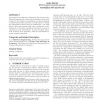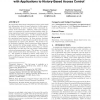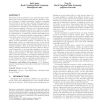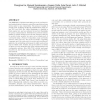CCS
2005
ACM
14 years 5 months ago
2005
ACM
CCS
2005
ACM
14 years 5 months ago
2005
ACM
Peer-to-peer VoIP calls are becoming increasingly popular due to their advantages in cost and convenience. When these calls are encrypted from end to end and anonymized by low lat...
CCS
2005
ACM
14 years 5 months ago
2005
ACM
Human-memorable passwords are a mainstay of computer security. To decrease vulnerability of passwords to bruteforce dictionary attacks, many organizations enforce complicated pass...
CCS
2005
ACM
14 years 5 months ago
2005
ACM
We investigate whether it is possible to encrypt a database and then give it away in such a form that users can still access it, but only in a restricted way. In contrast to conve...
CCS
2005
ACM
14 years 5 months ago
2005
ACM
The Framework of Selective Interleaving Functions and the Modular Assembly Kit for Security Properties both provide a basis for the uniform representation and formal analysis of n...
CCS
2005
ACM
14 years 5 months ago
2005
ACM
In a reputation-based trust-management system, agents maintain information about the past behaviour of other agents. This information is used to guide future trust-based decisions...
CCS
2005
ACM
14 years 5 months ago
2005
ACM
Protocols for authenticated key exchange (AKE) allow parties within an insecure network to establish a common session key which can then be used to secure their future communicati...
CCS
2005
ACM
14 years 5 months ago
2005
ACM
Automated trust negotiation is an approach which establishes trust between strangers through the bilateral, iterative disclosure of digital credentials. Sensitive credentials are ...
CCS
2005
ACM
14 years 5 months ago
2005
ACM
Recent work [27, 15] introduced a novel peer-to-peer application that leverages content sharing and aggregation among the peers to diagnose misconfigurations on a desktop PC. Thi...
CCS
2005
ACM
14 years 5 months ago
2005
ACM
The IEEE 802.11i wireless networking protocol provides mutual authentication between a network access point and user devices prior to user connectivity. The protocol consists of s...




